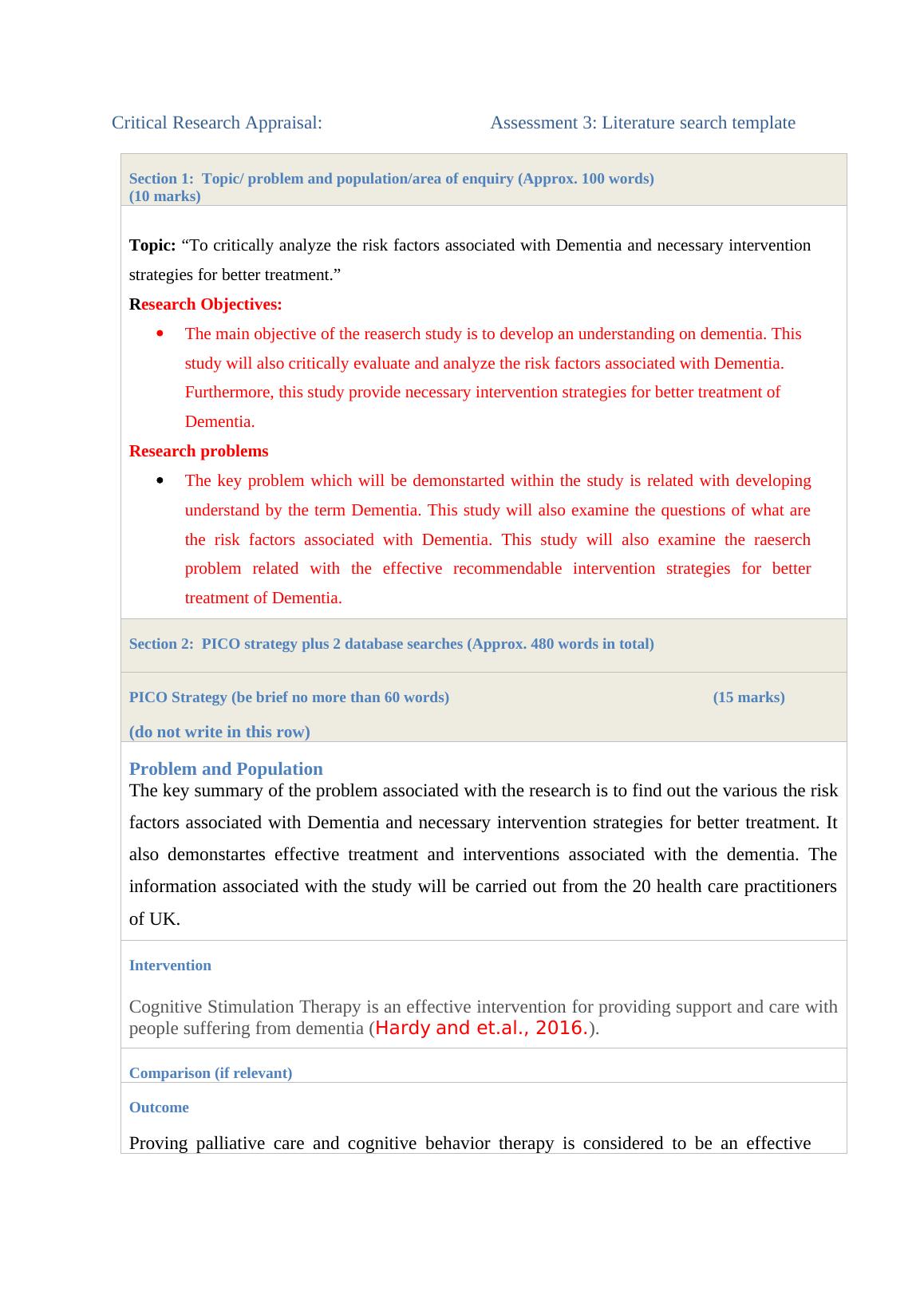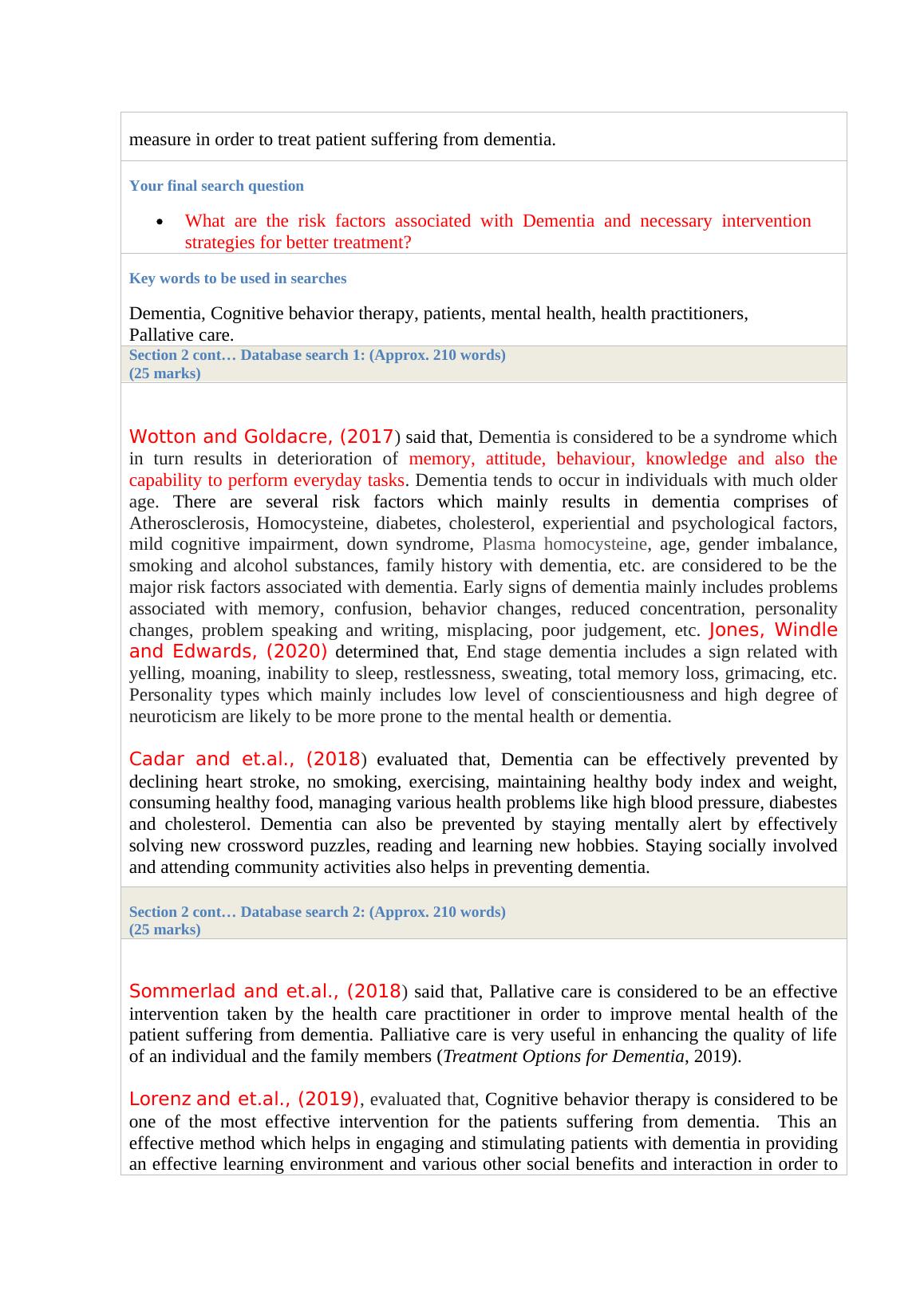Critical Research Appraisal: Assessment 3
Added on 2023-01-17
4 Pages1371 Words34 Views
Critical Research Appraisal: Assessment 3: Literature search template
Section 1: Topic/ problem and population/area of enquiry (Approx. 100 words)
(10 marks)
Topic: “To critically analyze the risk factors associated with Dementia and necessary intervention
strategies for better treatment.”
Research Objectives:
The main objective of the reaserch study is to develop an understanding on dementia. This
study will also critically evaluate and analyze the risk factors associated with Dementia.
Furthermore, this study provide necessary intervention strategies for better treatment of
Dementia.
Research problems
The key problem which will be demonstarted within the study is related with developing
understand by the term Dementia. This study will also examine the questions of what are
the risk factors associated with Dementia. This study will also examine the raeserch
problem related with the effective recommendable intervention strategies for better
treatment of Dementia.
Section 2: PICO strategy plus 2 database searches (Approx. 480 words in total)
PICO Strategy (be brief no more than 60 words) (15 marks)
(do not write in this row)
Problem and Population
The key summary of the problem associated with the research is to find out the various the risk
factors associated with Dementia and necessary intervention strategies for better treatment. It
also demonstartes effective treatment and interventions associated with the dementia. The
information associated with the study will be carried out from the 20 health care practitioners
of UK.
Intervention
Cognitive Stimulation Therapy is an effective intervention for providing support and care with
people suffering from dementia (Hardy and et.al., 2016.).
Comparison (if relevant)
Outcome
Proving palliative care and cognitive behavior therapy is considered to be an effective
Section 1: Topic/ problem and population/area of enquiry (Approx. 100 words)
(10 marks)
Topic: “To critically analyze the risk factors associated with Dementia and necessary intervention
strategies for better treatment.”
Research Objectives:
The main objective of the reaserch study is to develop an understanding on dementia. This
study will also critically evaluate and analyze the risk factors associated with Dementia.
Furthermore, this study provide necessary intervention strategies for better treatment of
Dementia.
Research problems
The key problem which will be demonstarted within the study is related with developing
understand by the term Dementia. This study will also examine the questions of what are
the risk factors associated with Dementia. This study will also examine the raeserch
problem related with the effective recommendable intervention strategies for better
treatment of Dementia.
Section 2: PICO strategy plus 2 database searches (Approx. 480 words in total)
PICO Strategy (be brief no more than 60 words) (15 marks)
(do not write in this row)
Problem and Population
The key summary of the problem associated with the research is to find out the various the risk
factors associated with Dementia and necessary intervention strategies for better treatment. It
also demonstartes effective treatment and interventions associated with the dementia. The
information associated with the study will be carried out from the 20 health care practitioners
of UK.
Intervention
Cognitive Stimulation Therapy is an effective intervention for providing support and care with
people suffering from dementia (Hardy and et.al., 2016.).
Comparison (if relevant)
Outcome
Proving palliative care and cognitive behavior therapy is considered to be an effective

measure in order to treat patient suffering from dementia.
Your final search question
What are the risk factors associated with Dementia and necessary intervention
strategies for better treatment?
Key words to be used in searches
Dementia, Cognitive behavior therapy, patients, mental health, health practitioners,
Pallative care.
Section 2 cont... Database search 1: (Approx. 210 words)
(25 marks)
Wotton and Goldacre, (2017) said that, Dementia is considered to be a syndrome which
in turn results in deterioration of memory, attitude, behaviour, knowledge and also the
capability to perform everyday tasks. Dementia tends to occur in individuals with much older
age. There are several risk factors which mainly results in dementia comprises of
Atherosclerosis, Homocysteine, diabetes, cholesterol, experiential and psychological factors,
mild cognitive impairment, down syndrome, Plasma homocysteine, age, gender imbalance,
smoking and alcohol substances, family history with dementia, etc. are considered to be the
major risk factors associated with dementia. Early signs of dementia mainly includes problems
associated with memory, confusion, behavior changes, reduced concentration, personality
changes, problem speaking and writing, misplacing, poor judgement, etc. Jones, Windle
and Edwards, (2020) determined that, End stage dementia includes a sign related with
yelling, moaning, inability to sleep, restlessness, sweating, total memory loss, grimacing, etc.
Personality types which mainly includes low level of conscientiousness and high degree of
neuroticism are likely to be more prone to the mental health or dementia.
Cadar and et.al., (2018) evaluated that, Dementia can be effectively prevented by
declining heart stroke, no smoking, exercising, maintaining healthy body index and weight,
consuming healthy food, managing various health problems like high blood pressure, diabestes
and cholesterol. Dementia can also be prevented by staying mentally alert by effectively
solving new crossword puzzles, reading and learning new hobbies. Staying socially involved
and attending community activities also helps in preventing dementia.
Section 2 cont... Database search 2: (Approx. 210 words)
(25 marks)
Sommerlad and et.al., (2018) said that, Pallative care is considered to be an effective
intervention taken by the health care practitioner in order to improve mental health of the
patient suffering from dementia. Palliative care is very useful in enhancing the quality of life
of an individual and the family members (Treatment Options for Dementia, 2019).
Lorenz and et.al., (2019), evaluated that, Cognitive behavior therapy is considered to be
one of the most effective intervention for the patients suffering from dementia. This an
effective method which helps in engaging and stimulating patients with dementia in providing
an effective learning environment and various other social benefits and interaction in order to
Your final search question
What are the risk factors associated with Dementia and necessary intervention
strategies for better treatment?
Key words to be used in searches
Dementia, Cognitive behavior therapy, patients, mental health, health practitioners,
Pallative care.
Section 2 cont... Database search 1: (Approx. 210 words)
(25 marks)
Wotton and Goldacre, (2017) said that, Dementia is considered to be a syndrome which
in turn results in deterioration of memory, attitude, behaviour, knowledge and also the
capability to perform everyday tasks. Dementia tends to occur in individuals with much older
age. There are several risk factors which mainly results in dementia comprises of
Atherosclerosis, Homocysteine, diabetes, cholesterol, experiential and psychological factors,
mild cognitive impairment, down syndrome, Plasma homocysteine, age, gender imbalance,
smoking and alcohol substances, family history with dementia, etc. are considered to be the
major risk factors associated with dementia. Early signs of dementia mainly includes problems
associated with memory, confusion, behavior changes, reduced concentration, personality
changes, problem speaking and writing, misplacing, poor judgement, etc. Jones, Windle
and Edwards, (2020) determined that, End stage dementia includes a sign related with
yelling, moaning, inability to sleep, restlessness, sweating, total memory loss, grimacing, etc.
Personality types which mainly includes low level of conscientiousness and high degree of
neuroticism are likely to be more prone to the mental health or dementia.
Cadar and et.al., (2018) evaluated that, Dementia can be effectively prevented by
declining heart stroke, no smoking, exercising, maintaining healthy body index and weight,
consuming healthy food, managing various health problems like high blood pressure, diabestes
and cholesterol. Dementia can also be prevented by staying mentally alert by effectively
solving new crossword puzzles, reading and learning new hobbies. Staying socially involved
and attending community activities also helps in preventing dementia.
Section 2 cont... Database search 2: (Approx. 210 words)
(25 marks)
Sommerlad and et.al., (2018) said that, Pallative care is considered to be an effective
intervention taken by the health care practitioner in order to improve mental health of the
patient suffering from dementia. Palliative care is very useful in enhancing the quality of life
of an individual and the family members (Treatment Options for Dementia, 2019).
Lorenz and et.al., (2019), evaluated that, Cognitive behavior therapy is considered to be
one of the most effective intervention for the patients suffering from dementia. This an
effective method which helps in engaging and stimulating patients with dementia in providing
an effective learning environment and various other social benefits and interaction in order to

End of preview
Want to access all the pages? Upload your documents or become a member.
Related Documents
Critical Research Appraisal: Assessment 3lg...
|3
|1142
|55
Assignment on the Nursing 2022lg...
|6
|948
|19
Case Study Analysis of Alzheimer Diseaselg...
|9
|2433
|21
Evidence for Informing Practicelg...
|5
|887
|186
Evidence for Informing Practice in Dementialg...
|1
|641
|370
Clinical Governance and Practice Improvementlg...
|11
|2388
|66
